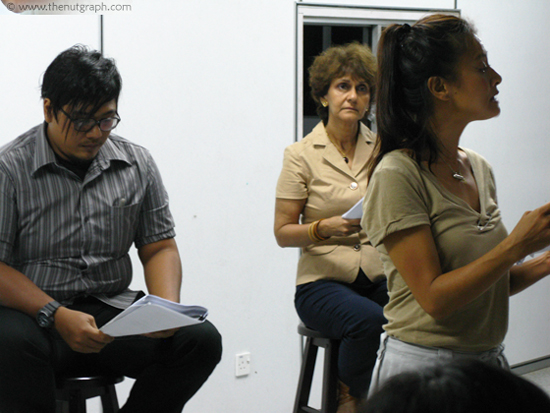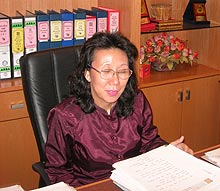I DIDN’T live through the racial clashes of
13 May 1969. I was born a year after. And yet, throughout my childhood and into my adulthood, just mentioning “13 May” evoked whispered warnings and an unnameable fear.

In the aftermath of 13 May: A few days later, at the corner of Jalan Yap Ah Shak and Hale Road in Kuala Lumpur (Pic by Hassan Muthalib)
What is it about 13 May that gives rise to fear and suspicion that fellow Malaysians might re-enact the violence of 42 years ago? As citizens and a nation, what have we been told – and continue to be told – that makes us believe that it will take little for hatred of another race to explode into bloodshed and mayhem at any moment?
For certain, those who experienced or witnessed the violence of the clashes, and many who lived to tell the tale today, have reason to associate
13 May with a dark period in our nation’s history. That the racial clashes, arising in part from suspicion and fear of another race, caused untold deaths, injuries and damage, is undeniable.
However, beyond that singular story of racial hatred and distrust – primarily between Malay and Chinese Malaysians – are other narratives, many of which have not found their way into our collective understanding of why 13 May happened. What are these
narratives, and what do they tell us about 13 May and about today’s politicians?
What the Chinese did
From 11 to 13 May 2011 in Penang and on 14 May in Kuala Lumpur,
Five Arts Centre and Pocketsize Productions staged a workshop presentation of stories of 13 May 1969. The presentation was titled
I was 13 at the time. On the day it happened…
In my research to curate the different narratives about the incident for the reading, one thing above all surprised me. Chinese Malaysians, it was reported, were clearly responsible for the rising racial tensions that exploded on the streets of Kuala Lumpur in the evening of 13 May 1969. What did the Chinese Malaysians do?
The results of the 10 May 1969
general election showed that Chinese and Indian Malaysian voters had deserted the ruling Alliance, rejecting the MCA and MIC in favour of the opposition DAP and Gerakan (which later joined the Alliance, then known as the Barisan Nasional or BN, in 1973). This left the Umno-led Selangor government in a precarious position.

(From right) Foo May Lyn, Lucille Dass and Shah Zainal during the workshop performance by Five Arts Centre and Pocketsize Productions
In Goh Cheng Teik’s
The May Thirteenth Incident and Democracy in Malaysia (1971), he writes: “Realising that the Umno branch in Selangor was in a precarious situation, bands of youthful sympathisers from the DAP and Gerakan headed towards Dato Harun (Idris)’s house in Jalan Raja Muda and rudely invited him to quit this state residence since he was allegedly no longer Menteri Besar. At processions held to celebrate individual Opposition successes, youthful Chinese and Indian supporters booed and jeered at Malays they encountered or at Malay houses they passed … Some of these were: ‘Kapal layar bochor!’; ‘Melayu sudah jatoh!’; ‘Melayu sekarang ta’ada kuasa lagi!’; ‘Kuala Lumpur sekarang China punya!’; ‘Melayu boleh balek kampong!’”
William C Parker, Jr, as quoted by John G Butcher in
May 13: A Review of Some Controversies in Accounts of the Riots, writes that there were “repeated instances of physical harassment and of threats and insults directed at Malays by non-Malay demonstrators in Kuala Lumpur on May 11th, 12th and 13th. These included threats of killing and serious bodily harm. Insults included ethnic slurs and obscenities, and also instances of indecent exposure … ”
These insults and threats only succeeded in angering Umno members and supporters in Selangor, and added fuel to the pre-existing suspicion and fear some Malay Malaysians had of Chinese Malaysian domination and ascendancy at a critical juncture in our history. However, these taunts and the potential loss of political power for the Malays cannot justify the violence that was finally unleashed upon Chinese, and to some extent Indian, Malaysians.
Still, there is no denying that the provocative behaviour of the jubilant DAP and Gerakan supporters was one of several factors that eventually led to a tense situation where violent retaliation seemed to be a justifiable option. I’m no historian, and my research for the workshop reading was, for certain, limited to published texts I could find. But the historical documentation does suggest strongly that Chinese Malaysians weren’t just passive victims who were suddenly and irrationally set upon by the Malays.
What Umno is doing
Fast forward 40 years later, and what do we see?
The same behaviour employed by some Chinese Malaysians in 1969 is today being repeatedly used to invoke racial fear, hatred, anger and suspicion. But it is not being employed by Chinese Malaysians or politicians. Rather, it is being used by certain Malay Malaysians, such as some in Umno, and
Perkasa and
Pembela leaders who tell non-Malay Malaysians they are “
pendatang”.
They insist that non-Malay, non-Muslim citizens have less rights because “
ketuanan Melayu” is somehow enshrined in the Federal Constitution. And should any citizen object to the notion of Malay supremacy, we are told that we can get out of the country, in other words “balik kampong!”, even if our home is in Malaysia.

Datuk Ahmad Ismail, infamous for having called Chinese Malaysians pendatang during a ceramah in 2008 (Ahmad Ismail pic courtesy of Oriental Daily)
These same individuals and groups are also the ones who warn non-Malays that
Malays will run amok and
spill blood if they don’t get what they want regardless of the legitimacy of their demands. The same tactic to stir up racial strife and anxiety is being used by Umno-owned
Utusan Malaysia, which unethically and irresponsibly reports half truths, threatens that
Malay Malaysians are close to having their power snatched away, and conjures fiction about a
non-Muslim takeover of the country.
It would seem then that while non-Malay Malaysian politicians and groups have learnt the lesson of 13 May and are no longer willing to risk the consequences of unnecessary taunting and provocation,
Umno, Pembela, Perkasa,
Utusan Malaysia and even
Berita Harian haven’t.
Remember that after the historic 2008 elections where the opposition denied the BN its two-thirds majority like it first did in 1969, the Pakatan Rakyat made clear there would be no victory marches on the streets. Additionally, it isn’t non-Malay individuals, groups or political parties that are exhorting for racial/religious domination at the expense of the rights of other citizens.
And yet today we are more segregated than we have ever been. And racial tension is continuously stoked and invoked as a national sport, as if 13 May wasn’t lesson enough for all of us, whether we lived through it or not.
What then becomes clear for me is this: It isn’t a repeat of 13 May per se that we should fear. What we should revile and reject are the individuals and groups who did not learn the lessons of 13 May.
By recreating some of the conditions that led to the racial clashes that have defined our nation ever since, it is clear that these individuals and groups want another 13 May. After the 1969 riots, a national emergency was declared and Parliament, indeed democracy, was suspended until 1971. The country was ruled by a National Operations Council (NOC) that placed all power in one man – Tun Abdul Razak.

Tun Abdul Razak (Wiki commons)
In the preface to the NOC report on 13 May, Razak, who was the NOC director of operations, wrote: “May 13, 1969 will go down in our history as a day of national tragedy … On that day we were jolted into a sharp realisation that the racial problem in this country is a serious one and measures taken in the past to cope with it have not proved adequate … The lesson of the recent disturbances is clear. This nation cannot afford to perpetuate a system that permits anybody to say or do things which would set one race against another. If the events of May 13 are not to occur again, if this nation is to survive, we must make sure that subjects which are likely to engender racial tensions are not exploited by irresponsible opportunists.”
More than 40 years after the tragedy of 13 May, Razak, who was eventually Umno president and our nation’s second prime minister, must be turning in his grave.












 KUALA LUMPUR, May 20 — Malaysians can expect food prices to go up by some eight per cent by year-end with “haphazard” subsidy cuts driving the country’s worsening inflation, Datuk Seri Anwar Ibrahim has said.
KUALA LUMPUR, May 20 — Malaysians can expect food prices to go up by some eight per cent by year-end with “haphazard” subsidy cuts driving the country’s worsening inflation, Datuk Seri Anwar Ibrahim has said. MAY 20 — I am a Malaysian Chinese and please notice that I did not mention Chinese Malaysian as I feel that one should be a Malaysian first and a Chinese second. I love Malaysia and as a kid I had wonderful memories growing up in Penang. When I was 19, I went to Singapore for my university education as my Bahasa grade was not good enough to qualify for local university entrance.
MAY 20 — I am a Malaysian Chinese and please notice that I did not mention Chinese Malaysian as I feel that one should be a Malaysian first and a Chinese second. I love Malaysia and as a kid I had wonderful memories growing up in Penang. When I was 19, I went to Singapore for my university education as my Bahasa grade was not good enough to qualify for local university entrance.






 Still a horrific situation
Still a horrific situation
